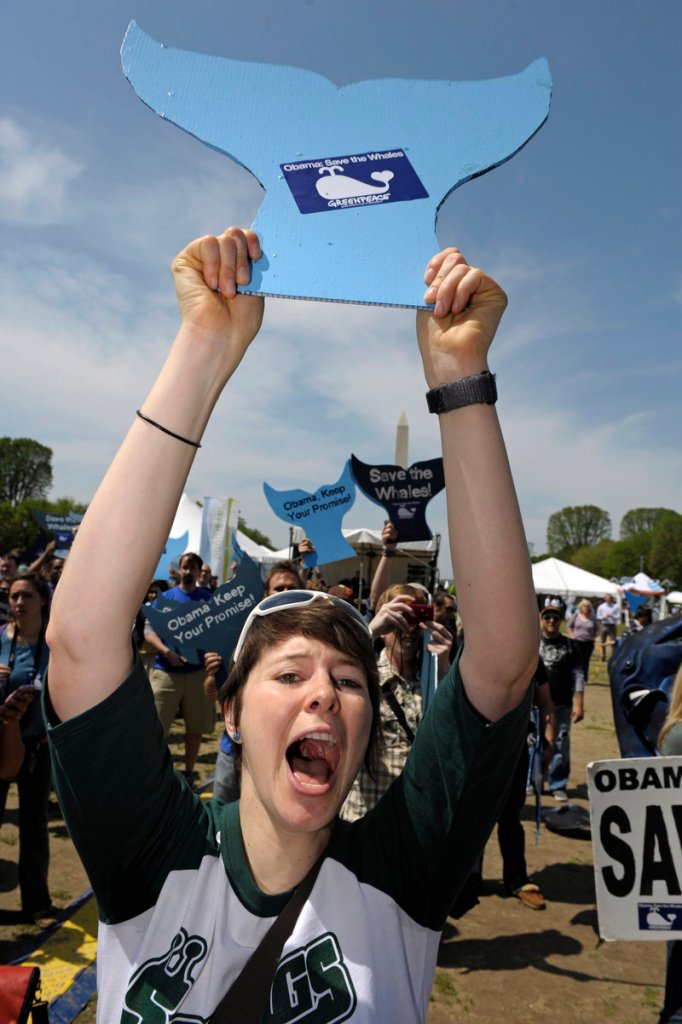WASHINGTON – There was no “green” movement yet and little talk of global warming. Instead, the original Earth Day 40 years ago emphasized “ecology” and goals like cleaning up pollution and litter — along with a more anti-establishment vibe than today.
“Welcome, sulfur dioxide, hello, carbon monoxide,” a woman sang from the 1968 Broadway hit “Hair” at a rally in Philadelphia that day. Across the country, activists donned gas masks or spread out in grassy parks to hear speeches about overpopulation, smog and dirty rivers.
“It was brand new on the scene. We were basically using a new vocabulary,” recalled Denis Hayes, who was the 25-year-old national coordinator for that first Earth Day. “So it was all fresh.
“In 1969, most Americans couldn’t even define the word environment,” Hayes said. “the end of 1970, a huge fraction of them thought of themselves as environmentalists.”
The movement capitalized on the experience and passion of activists who had organized anti-war, civil rights and feminist rallies in the 1960s. Today, the environmental cause is far more sophisticated, with thousands of environmental lawyers and advocates with advanced degrees and corporations rushing to advertise green products.
“But some of that passion that we had in 1970 has faded,” Hayes said.
The original Earth Day was the brainchild of the late Sen. Gaylord Nelson, D-Wis., who called for a nationwide teach-in on the environment in a speech in Seattle in September 1969. His daughter, Tia Nelson, said he decided to launch it after a major oil spill in California, and wrote the speech on airplane napkins.
Forty years ago Thursday, the youth-driven movement sparked participation of about 2,000 college campuses and 10,000 elementary and high schools. Congress adjourned so members could give speeches, tens of thousands of people filled Fifth Avenue in New York City — which was closed to traffic — and millions took part across the country in activities like trash removal and bicycle rides.
Many people used the word “ecology” to describe the cause — “a shorthand way to say we need to think more holistically,” said Adam Rome, an environmental historian at Penn State who is writing a book on the first Earth Day.
“Ecology” went out of fashion later because it had a “a hippie-ish, countercultural” feel, Rome said, as the movement worked to cultivate an image of professionalism and legal expertise.
Although politicians took part in the first Earth Day, organizers stiff-armed the Nixon administration. Hayes declined a White House invitation for a meeting a few weeks before the event, and President Richard Nixon himself did not participate in any Earth Day activities. contrast, the Obama administration is participating in five days of events to commemorate the 40th anniversary.
President Obama marked the occasion with an event in the Rose Garden on Thursday afternoon that Hayes attended. Obama hailed the history of the day and cited a renewed commitment “to passing a comprehensive energy and climate bill that will safeguard our planet and spur innovation and help us to compete in the 21st century.”
Russell Train, who was the first chairman of the newly created White House Council on Environmental Quality in 1970, told a TV interviewer at the time that Earth Day organizers were anxious to “make it their own thing” and not have the government take it over.
“And we’ve been anxious to not give the impression that we’re trying to take anything away from them either — it is their thing, and that’s all to the good,” said Train, who later went on to serve as Environmental Protection Agency administrator.
Train, now chairman emeritus of the World Wildlife Fund, said in an interview this week that Nixon considered Earth Day “a bit of an irrelevance.”
“I don’t think the environment came very naturally to Richard Nixon as a high priority,” Train recalled. “But he very quickly latched on to it as an important thing for the administration to work on,” in part because of political considerations.
In fact, Nixon had devoted a good chunk of his State of the Union address in January 1970 to the environment, saying, “Through our years of past carelessness we incurred a debt to nature, and now that debt is being called.” The EPA was created later that year.
There was also a chasm between organizers and corporate America.
“In that first Earth Day, companies were not supportive of the cause,” Tia Nelson remembers. Now corporations including Wells Fargo, UPS and Procter & Gamble sponsor Earth Day events.
Despite the differences, there are some striking similarities to today’s debate — such as dire predictions about the planet’s future.
Send questions/comments to the editors.



Success. Please wait for the page to reload. If the page does not reload within 5 seconds, please refresh the page.
Enter your email and password to access comments.
Hi, to comment on stories you must . This profile is in addition to your subscription and website login.
Already have a commenting profile? .
Invalid username/password.
Please check your email to confirm and complete your registration.
Only subscribers are eligible to post comments. Please subscribe or login first for digital access. Here’s why.
Use the form below to reset your password. When you've submitted your account email, we will send an email with a reset code.